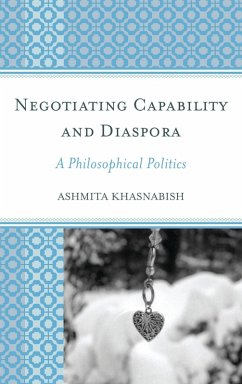Negotiating Capability and Diaspora: A Philosophical Politics scrutinizes Indian economist cum philosopher Amartya Sen's theory of capability, which rose as a critique of the modern American philosopher John Rawls's theory of primary goods. Ashmita Khasnabish develops Sen's theory of capability as a leitmotif throughout the book. She focuses on the following themes: 1) how Amartya Sen's theory of capability offers strength to immigrants and underdogs; 2) the significance of John Rawls's theory for Sen's theory of capability; 3) two aspects of Sen's theory: on the one hand it exposes the asymmetry between people of power and the powerless due to the discrepancy of resources, and on the other hand it shows how the powerless or the underdogs or the minorities could exert their will-power through the paradigm of choices to overcome; 4) finally, Sri Aurobindo's theory of democracy, which intersects with John Rawls's theory of comprehensive doctrines and political justice. Khasnabish also discusses authors Amitav Ghosh, Jhumpa Lahiri, and Toni Morrison, whose novels illustrate different facets of the theory of capability. Negotiating Capability and Diaspora develops themes that will be of great interest to students and scholars of political philosophy, feminist philosophy, postcolonial studies, literary studies, Diaspora studies, and world literature.
Bitte wählen Sie Ihr Anliegen aus.
Rechnungen
Retourenschein anfordern
Bestellstatus
Storno









